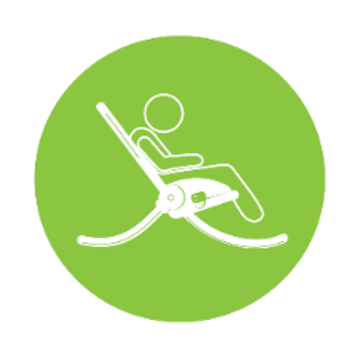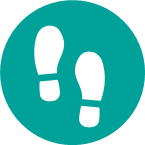When an elderly person falls, the results can be devastating, with potentially life-changing consequences. Disability, loss of independence and a gradual decline can follow.
That’s why, in Bedfordshire, Luton and Milton Keynes (BLMK), we want to stop people suffering falls wherever possible. Our falls prevention programme is made up of a number of different initiatives designed to keep people safe from falling, no matter where they live – in their own home or residential care. We want to not only reduce falls, but also the harm caused by them.
We also know it’s not easy to safely get people back on their feet when they do have a fall, and that care home residents are three times more likely to fall than frail elderly people living in their own home. So we’ve introduced a new way for care homes to lift their residents without the need to call an ambulance.
Felicity Cox, Chief Executive of NHS Bedfordshire, Luton and Milton Keynes Integrated Care Board has recorded a series of podcasts, including a conversation on the increasing development of digital innovations in healthcare. You can listen to all podcasts on Apple Podcasts or Spotify.

Raizer chairs
175 chairs deployed across 145 care locations
You can read more about these important developments below.
Emergency chairs to lift people when they fall
The Raizer II is an emergency chair that’s put together around a person to lift them from the floor after a fall in which they have not been injured.
A single member of staff can get a care home resident back on their feet quickly and safely using the chair – all with little or no physical effort.
It means there’s no need to call an ambulance, or for the resident to stay on the floor while they wait for an ambulance to arrive. What’s more, the fast return to normality means they can avoid any possible health issues lying on the floor for a long time might cause, so are less likely to need a hospital stay.
For care homes, not only does the chair mean they can improve the care they’re able to provide, the single-person operation means they can also save time and money as other staff can continue caring for the other residents.
Press releases:
- Raizer chair cuts A&E visits by local care home residents
- Supplying local care homes with Raizer chairs to lift residents after a fall saves staff time and reduces ambulance call-outs
What residents say:
“I had paramedics out before due to a fall, but on this occasion, the rapid response team came out. The Raizer Chair was absolutely brilliant, so much more comfortable. I felt safer on it. The nurses were very good at checking me over and made sure I was comfortable at all times. I was really pleased.” – Feedback via Cambridge Community Services Family Friendly Test
“The staff members have used the Raizer Chair previously to help me after I unfortunately had a fall. I think it is very good to have in the home as for me, it is not always as easy to get up a fall as it has been in the past.” – JG, resident at Burlington Hall Care Home for more than eight years (read Burlington Hall case study)
What our care services say:
“We have found the chair really useful. I attended the training initially and have then trained my staff how to use it, it is really easy to use and assemble, and we are extremely pleased. We have also had positive feedback from family members who witnessed the training session.” – Laura Gibney, Manager, Collinson Care Home (read case study)
“We use the Raizer chair to assist people up who have fallen (within restrictions). This ensures they are not left on the floor for long periods of time leading to hospital admissions and a decline in health and mobility. We can act quickly to assure the client and get them back up on their feet safely, helping relieve the pressure on the ambulance service. This has been well received by our clients and their families – they are impressed with how it works, how quick it is and how smooth the lifting is.” – Dana West, Manager, Home Instead Milton Keynes
“We couldn’t live without the Raizer Chair now – it’s amazing.” – Fay Gooch, Home Manager, Oak Manor Care Home
“The Raizer Chair is easy to use and kind to the person who is being assisted by it. Possibly the best piece of equipment to come into the care sector for years.” – Dawn McGuire, Registered Manager, Chase House Residential Nursing Care Home
Individual assessments of gait to improve balance and stability
Using wireless sensors, GaitSmart records an individual’s movements over 10 to 15 steps. In minutes, the system compares the readings to ‘healthy’ gait profiles and produces a report suggesting interventions and exercises that can address strength, stability or balance issues.
The test takes 10 minutes, can be carried out virtually anywhere, and is suitable for people using walking aids. Repeating the tests over a period of time gives the opportunity to monitor progress and modify the exercise plan if needed.
GaitSmart is quick and easy for trained staff to use in a range of settings. A 12-month pilot funded by NHS England is currently underway in BLMK to evaluate the outcomes, acceptability, usability and patient experience of the technology.
Our pilot sites include a frailty clinic, two GP practices, Bedford Falls Service, and the Community Physical Activity Team at Central Bedfordshire Council.
We are currently working with Health Innovation East to support implementation, with the final evaluation of the pilot due in March 2025. To date the technology has been well received, with people reporting improvements in mobility, confidence and balance after the 12-week programme.
Research looks for clues to stop people falling
As part of our falls prevention programme, we’re giving people who live in BLMK the chance to take part in a research study aimed at helping people live safer, healthier lives at home for longer. In the UK, around a third of people aged 65 and over fall at least once a year.
The Smplicare study is looking at how to predict the likelihood of people having a fall, and could lead to the creation of software that could help prevent others having falls in future. Everyone who takes part will be given a free smartwatch or fitness band and a set of smart scales. Participants will be able to keep this research kit at the end of the study.
To have a chance of being chosen to be part of this exciting project, you must be over 55 years old, have a history of falls, and use a smartphone. If you would like to know more, including how to put yourself forward as a volunteer, please read this flyer and frequently asked questions.
You can find out more about what we’re doing by clicking on each of the links below. For more information on the programme, or any of our projects, please email the team.


